SickKids fellows work to help improve childhood cancer care worldwide
Summary:
A Q&A with former and current SickKids fellows who are working in Haematology/Oncology care around the world.
Globally, more than 400,000 children and youth are diagnosed with cancer each year (International Childhood Cancer Day, 2022). Though many countries in the world are seeing an improvement in childhood cancer diagnosis and care, survival rates can differ drastically depending on where a child lives. High-income countries can have survival rates as high as 80 per cent, but low and middle income countries (LMICs) may have rates as low as 20 per cent.
The vision of the Hospital for Sick Children (SickKids) is Healthier Children. A Better World™. That’s why SickKids’ Centre for Global Child Health and Garron Family Cancer Centre are working to help improve childhood cancer care and survival rates not only in Canada but around the world. Fellowships, research, and capacity-building partnerships like the SickKids-Caribbean Initiative (SCI), a cancer and blood disorder-focused collaboration between SickKids and various Caribbean institutions, are helping to do just that.
Meet five former and current Haematology/Oncology fellows who came to SickKids from around the world, and learn about how they hope to improve childhood cancer care in Canada and in their home countries.
Current Fellows at SickKids
Dr. Orrigio from Jamaica
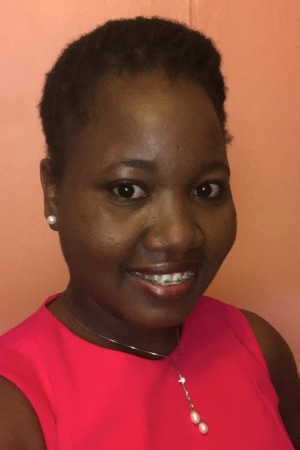
Dr. Kadine Orrigio grew up in Jamaica, in a community on the eastern end of the island. There, she attended the University of the West Indies, Mona where she obtained a Bachelor of Medicine, Bachelor of Surgery as well as a Doctor of Medicine degree in Paediatric Medicine. Dr. Orrigio subsequently worked at Jamaica’s Bustamante Hospital for Children (BHC) in the Haematology/Oncology Department. Now a second-year Clinical Fellow in the Paediatric Haematology/Oncology training program at SickKids, Dr. Orrigio will complete three years of formal training, funded through the SickKids-Caribbean Initiative (SCI).
What was your journey to becoming a fellow at SickKids? Can you tell us about how your fellowship has been supporting childhood cancer care?
During my residency in Jamaica, it was through my many daily interactions with patients who were diagnosed with cancer that I decided to pursue further studies in Haematology/Oncology. Working with children with cancer and their families requires one who is committed, courageous and not easily deterred. I felt the need to be a part of something that will provide care to these patients and parents who at times feel hopeless. SickKids is renowned in the Haematology/Oncology field and I was confident it would not just provide the clinical experience I need but allow for professional development, an inclusive culture and the ability to build a network to continue collaboration on returning home to Jamaica.
Through the SickKids-Caribbean Initiative (SCI), we have been able to provide advanced care in Jamaica to our patients, through consultation with SickKids staff and facilitating investigations not routinely offered there. Participating in the SCI education sessions through teleconferencing with SickKids staff gave me insight and provided me with a window into the Haematology/Oncology program offered at SickKids. I am always in awe at the wealth of knowledge and the level of expertise shown during these consultations. This made me quite eager to become a part of such an esteemed institution with the hope of expanding my knowledge by being exposed to new and revolutionary management options. I am confident that it will provide me with the opportunity to incorporate my basic knowledge with ongoing research to provide optimal patient care.
What are your plans once you finish your fellowship? Is there a goal or milestone you would like to achieve for childhood cancer care in your career?
On completion of training, I will return to my home country, Jamaica, as a fully trained Consultant in Paediatric Haematology/Oncology. I will work at the Bustamante Hospital for Children (BHC) as the second paediatric Haematologist/Oncologist. BHC is a government-funded hospital in Kingston and is the only specialist children’s hospital in Jamaica. Though the Caribbean may not be as advanced in the level of care offered, it is my hope that with the knowledge and training obtained through the SCI we will continue to offer the best care possible by utilizing our limited resources with the aim to continue to improve the outcome for children with cancer and blood disorders.
Dr. Nkabi from South Africa
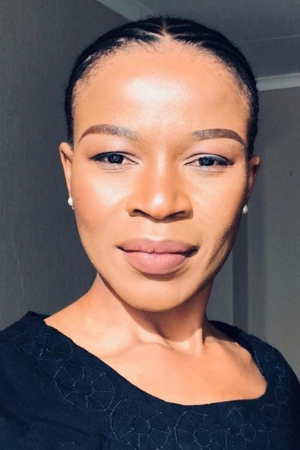
South Africa’s Dr. Thandeka Nkabi is currently pursuing fellowship training in Bone Marrow Transplant and Cellular Therapy under the collaboration of SickKids and the Nelson Mandela Children’s Hospital (NMCH) in Johannesburg, which opened in 2017. Holding an undergraduate Medical Degree, as well as a Post-Graduate Diploma in Paediatric Palliative Care from the University of Cape Town, Dr. Nkabi pursued and completed a Post-Graduate Paediatric training together with Oncology training from the University of Pretoria in South Africa. Meet Dr. Nkabi and learn about her goal to bring better cancer care to children and youth in Africa.
What was your journey to becoming a fellow at SickKids? Can you tell us about how your fellowship has been supporting childhood cancer care?
Core to the opening of the Nelson Mandela Children’s Hospital is the intention to offer specialized care, including Oncology services, beyond the standard chemotherapy programs that are well established and successful in Gauteng province. As a medical professional seeking to advance therapies offered in Oncology, I have been fortunate to secure a fellowship to SickKids through a collaborative program set up through Nelson Mandela Children’s Hospital; to enable me to make meaningful contributions in the field.
SickKids has provided an excellent training environment beyond my initial expectations. The training is affording me unlimited exposure and steps crucial in my learning and career development. It has been an exciting journey in which I have been able to expand my knowledge base of Haematology and Oncology, but more importantly develop skills to perform bone marrow transplants, whilst also being involved in research projects that advance cancer treatment for affected children.
The Bone Marrow Transplant and Cellular Therapy training program is uniquely designed and structured to suit my set-out learning objectives. This is achieved not only by providing the academic aspects of Bone Marrow Transplant and Cellular Therapy, but also including training in Research, Quality and Program Management, and further involving me in the various steps of transplant like Apheresis, Histocompatibility laboratory and Stem Cell laboratory rotations. This program will not only inform the development and successful management of the bone marrow transplant unit at NMCH but will also advance teaching and training programs for Oncology fellows in South Africa.
What are your plans once you finish your fellowship? Is there a goal or milestone you would like to achieve for childhood cancer care in your career?
At the end of my fellowship at SickKids, I will head back to NMCH in South Africa to start the Haematology and Oncology program, which will also offer bone marrow transplant. This will hopefully expand further to train fellows from neighbouring African states.
My greater goal in life is to witness lifesaving treatments like bone marrow transplant and cellular therapy become accessible and readily available for children in Africa. To see research development in Africa, responding to questions relevant to the African context and unique to the African population. Although African paediatric health care is impacted by a lot of factors, such as poverty and nutritional needs of children, fighting the plight of infectious disease among many, I believe children faced with malignant and haematological diseases deserve a fighting chance for survival through advanced technologies and treatment.
Dr. Das from India
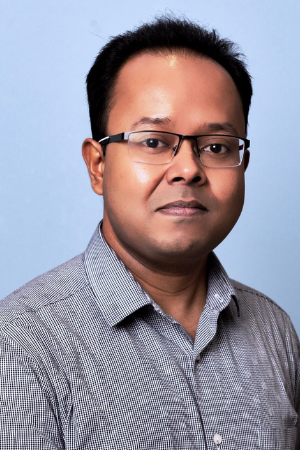
Dr. Anirban Das grew up in Kolkata, India. He completed his paediatric Haematology/Oncology training and worked at the Tata Medical Centre, where he established their paediatric neuro-oncology service. After additional training programs and observerships, Dr. Das joined the neuro-oncology program at SickKids in 2019 as the Chief Fellow. Learn more about Dr. Das and what he hopes to accomplish after his fellowship.
What was your journey to becoming a fellow at SickKids? Can you tell us about how your fellowship has been supporting childhood cancer care?
The paediatric neuro-oncology program at SickKids is internationally recognized as one of the, if not, the very best, led by an amazing group of mentors who lead their respective scientific fields globally. I was fortunate to be selected as the Chief Fellow for this dynamic, collaborative, inter-disciplinary team in July 2019. My work during this year was kindly supported by the Meagan‘s HUG and our analysis on a novel cohort of hypermutant medulloblastoma received a SIOP Young Investigator Award (2020). Subsequently, I was selected for SickKids Research Institute’s Clinician-Scientist Training Program and got the opportunity to work in the Uri Tabori lab at the Labatt Brain Tumour Research Centre. Here, my collaborative work on immunotherapy in a subset of fatal brain and metastatic cancers was awarded the SIOP Schweisguth prize (2021) and was recently published in Nature Medicine.
I also completed the Royal College of Ireland’s six-month Cancer Genetics Course and the SNO Clinical Trials Course. These led to the opportunity of co-leading an international network for a unique cancer-predisposition syndrome called The International Replication Repair Deficiency Consortium with Dr. Tabori. Here, I am involved in international patient consults and translational research, including co-developing potential immunotherapy clinical trials. Additionally, my collaborative work with my home institution in India is helping us diagnose these cancers in LMICs, allowing them to receive immunotherapy through crowdfunding, and undergo surveillance.
What are your plans once you finish your fellowship? Is there a goal or milestone you would like to achieve for childhood cancer care in your career?
My plan is to establish myself in academic paediatric neuro-oncology, and lead and collaborate across the cross-disciplinary fields of paediatric neuro-oncology, cancer genetics and immuno-oncology. So far, my work has been recognized by more than 45 peer-reviewed publications, awards and grants. My overarching, albeit ambitious, goal is to help unravel the genetic origins of fatal childhood brain cancers that are passed down through families and to find the most effective combination of immunotherapies to help improve their survival and limit harmful effects from traditional treatment approaches. Ultimately, I want to help translate these discoveries to impact children with these cancers and their families worldwide.
Previous Fellows at SickKids
Dr. Browne-Farmer from Barbados
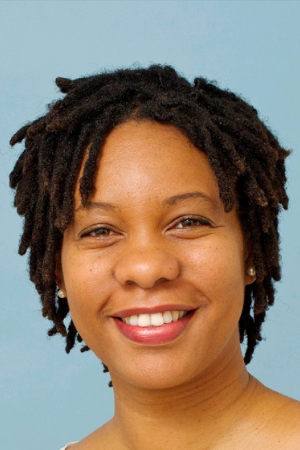
Born and raised in Barbados, Dr. Chantelle Browne-Farmer is a Consultant Paediatrician/Paediatric Haemato-Oncologist at the country’s Queen Elizabeth Hospital. Dr. Browne-Farmer pursued a medical degree in Trinidad and Tobago at the St. Augustine Campus of the University of the West Indies. After graduating in 2007, she then specialized in paediatrics during her residency in Barbados. Through the SickKids-Caribbean Initiative (SCI), Dr. Browne-Farmer later went on to pursue a paediatric Haematology and Oncology fellowship at SickKids. Afterwards, in 2019, she returned to Barbados determined to improve the care for children with blood disorders and cancers. Learn more about Dr. Browne-Farmer's continued work with SCI.
This year’s International Childhood Cancer Day theme is better care through our hands and better access to care for children and adolescents with cancer everywhere. What does this theme mean to you, and how does it relate to your own goals and priorities in your work?
To me, this theme speaks directly to what I hoped to achieve with SCI. We needed to enhance the capacity for care in the region by increasing the number of skilled health-care professionals in paediatric cancer and we have done that. In Barbados, for example, we have grown from one sessional physician and one outpatient nurse to two physicians, two inpatient nurses and one outpatient nurse. Our SickKids training was at the highest level and so we are able to use it to maximize our limited resources in Barbados to provide quality care for children and youth with cancer, and to educate other health-care professionals who may be caring for these children.
We are also part of a growing community of practice through SCI, including relationships with the American Society of Hematology and the International Society of Paediatric Oncology, which allows us to access expertise around the world when dealing with difficult cases of childhood cancer and to optimize the care we are offering in most cases right at home. This has been lifesaving in many instances.
What is something you would want children and youth with cancer, survivors, their families and advocates to know about childhood cancer?
Childhood cancer touches us all. It is not something that happens to a few kids in secret. There are so many children diagnosed with cancer daily and so many living with cancer, even in our Caribbean region, and I want people to be aware of that. I want our politicians to be aware of that and to prioritize childhood cancer on our health agendas. The COVID-19 pandemic has slowed that down considerably but hopefully, awareness days like International Childhood Cancer Day can put it back on everyone's radar so that we can do even better by these kids.
In the Caribbean, we lack access to on-site 'higher level' diagnostics like flow cytometry, molecular testing and cytogenetics. In some instances, we have the equipment but not being used for cancer diagnostics and the pandemic has even further stressed these laboratory services. I am hopeful that moving forward we can identify the enhancement of our diagnostic capabilities locally and regionally as an area of focus. The pandemic, to me, illustrated how fragile we can be as a region with limited resources isolated from the world. Even as we again resume global movement in our 'new normal' we in the Caribbean need to look at how we can improve our self-sufficiency and further improve access to care for our children in the region.
Dr. Dindial from Trinidad and Tobago
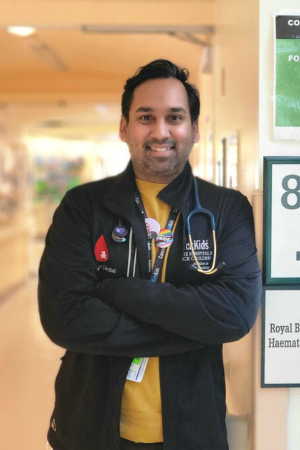
In June 2021, Dr. Kevon Dindial completed a fellowship in paediatric Haematology/Oncology at SickKids through the SickKids-Caribbean Initiative (SCI). Now, he’s the co-lead physician for SCI in Trinidad and Tobago where he works as a Consultant Paediatric Haematologist/Oncologist at the Eric Williams Medical Sciences Complex (EWMSC). Learn more about Dr. Dindial and his goal to help bridge the care gap.
This year’s International Childhood Cancer Day theme is better care through our hands and better access to care for children and adolescents with cancer everywhere. What does this theme mean to you, and how does it relate to your own goals and priorities in your work?
The theme this year is very relevant and resonates to me both on a personal and professional level. The truth is, there are still significant health disparities for children with cancer between low-resource countries and resource-rich ones. Having trained at SickKids and now back in my home country of Trinidad and Tobago, I have experienced health care at both levels. The lower outcomes in low-resource countries are impacted by several factors. This includes delay in diagnosis, limited supportive care for this very vulnerable population and the absence of life-saving immunotherapies and other specialized treatments such as bone marrow transplant and cellular therapies. Continued collaboration between SickKids and the EWMSC is happening through the SCI, which I believe is essential to improving the outcomes of children with cancer.
Additionally, engaging the local Ministry of Health and other governmental organizations are key in making impactful change and for long-term sustainability. Bridging this gap is one of my personal goals and with the continued support of SCI and local institutions, the future is bright for these children.
What is something you would want children and youth with cancer, survivors, their families and advocates to know about childhood cancer?
I would like people to know that a lot of work has been done and continues to be done for children with cancer and benign blood disorders in Trinidad and Tobago, both at a local and international level. That includes local philanthropic and governmental support and collaboration with SickKids and other international centres. Although receiving a cancer diagnosis for their child is something no parent should ever have to experience, I want families to know there is continued hope in childhood cancer therapies and there are many people working to address health care disparities in our region.

